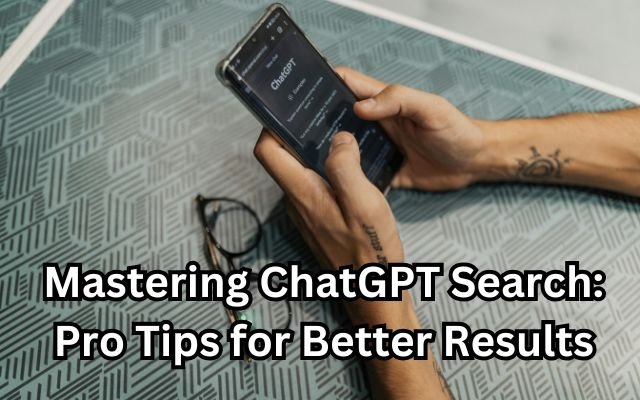Unlocking the Power of ChatGPT Search: Expert Tips to Search Like a Pro
Learn expert tips to master ChatGPT Search and get accurate, relevant results quickly. Unlock its full potential and search like a pro!

ChatGPT Search Secrets Revealed: With the right approach, ChatGPT Search can be a very useful tool. It provides dynamic and conversational results, which means it talks to you like a real person would. It doesn’t overwhelm you with a lot of irrelevant content, so you get just the information you need. When you learn the secrets to using ChatGPT Search, it can become your go-to search tool.
If you’re seeking for stuff for your research or are attempting to fix a technical problem, ChatGPT Search can be quite helpful. It gives you quick and easy answers to your questions. You can improve your search experience & search like an expert if you know the right tips & tricks. You will always receive the greatest results if you know secrets of ChatGPT Search.
Table of Contents
Advanced Search Tricks for ChatGPT
ChatGPT Search works differently from traditional search engines like Google. But don’t worry, using it effectively is easier than you might think. One useful tip is to use special commands called search operators. These operators help you get more accurate and relevant results without the clutter that often comes with regular web searches.
What Are Search Operators?
You can use special commands called search operators to broaden or filter down your search results. They are compatible with a variety of search engines and other tools.
Example: Finding ChatGPT Tutorials
Imagine you want to find all the tutorials about ChatGPT on the Teckplanet website. To see results especially from Teckplanet that include ChatGPT tips and tricks, just type “ChatGPT tutorials site:teckplanet.com” into the search bar.
Using Citations with ChatGPT Search
Another important difference to remember is how ChatGPT uses citations. Unlike Google which gives you a list of links, ChatGPT provides short summaries of information and includes citations to back up its answers. For instance, when I searched for “latest trends in AI ethics,” ChatGPT gave me brief snippets and referenced articles from reputable tech journals.
Always verify ChatGPT’s sources particularly if you are using data for professional or academic purposes. Additionally, you can request that ChatGPT only use reliable sources so that its responses come from particular or reputable websites. You won’t have to go through countless links to locate what you’re looking for thanks to this.
How to Find Specific Types of Content with ChatGPT Search
While Google is great for multimedia searches, ChatGPT Search helps locate specific content types like images, videos or PDFs. However, instead of displaying results directly, it provides guidance to the best sources.
You can find royalty-free images, for instance by Googling for “Best sites for free stock photos.” To assist you in selecting the finest platform, ChatGPT will list Unsplash & Pexels and explain their advantages.
Asking “Where to find free academic papers?” will also direct you to repositories like Google Scholar or arXiv if you’re looking for scholarly PDFs. ChatGPT can help you identify particular publications, research papers or technical reports by further refining your search. For instance: you can find reliable sources by searching for “Latest cybersecurity white papers PDF”.
Unlike YouTube ChatGPT operates differently, although it might suggest helpful video tutorials. Asking “Best YouTube channels for beginners” can provide you with selected selection of channels with concise summaries of their main topics if you’re learning Photoshop.
This function makes it simpler to locate the precise information you need by sifting through overflow of web content.
Refine Searches with Contextual Follow-Ups
ChatGPT Search stands out because it allows for contextual follow-ups. Unlike Google, where you need to start a new query every time, ChatGPT lets you build on previous questions, making searches more efficient and intuitive.
For example- Searching for “Best Affordable Noise-Canceling Earbuds 2024” can yield a ton of results for you to sort through if you are searching for reasonably priced noise-canceling earbuds. Alternatively, you can ask ChatGPT:
👉 “What are some good noise-canceling earbuds under $100?”
Then, instead of typing a whole new search you can follow up with:
👉 “Which of these has the best battery life?”
In this manner, you can iteratively improve your search and obtain accurate results without having to repeat yourself. It’s particularly useful for product comparison, topic research and tech troubleshooting.
Using ChatGPT for Creativity and Research
For both creative endeavors and in-depth research, ChatGPT Search is invaluable resource. Asking a scenario-based inquiry can help you come up with specific recommendations when you’re starting a new project. Say, for example: “I want to start YouTube channel but I can only commit to five hours a week.” How should I organize creation of my content? A detailed plan that includes video scripting, editing timelines & audience engagement tactics can be obtained from ChatGPT.
When used for study, ChatGPT excels at demythologizing difficult subjects. It can walk you through every stage of mastering data analysis, from comprehending fundamental statistics to using Python for data visualization. Additionally, it can offer links to tutorials & pertinent publications which can improve the organization and effectiveness of learning process.
When to Choose ChatGPT Search Instead of Google (and When to Avoid It)
ChatGPT Search is a helpful tool, but it doesn’t fully replace Google. It works best for summarizing complex topics, organizing research, brainstorming creative ideas, and refining searches through conversation.
ChatGPT can offer clear and simple answers if you’re searching for organized information, including detailed instructions or topic summaries. It provides answers in an uncomplicated manner and helps weed out extraneous stuff.
However, for real-time news, images, videos, or highly technical documents, Google is still better option. While ChatGPT provides citations, it’s always a good idea to verify sources through traditional search engines to ensure accuracy.
When used effectively, ChatGPT Search functions as intelligent research assistant that makes it simpler to locate pertinent information without having to comb through many web pages. While it won’t replace Google for everything—especially for breaking news and multimedia—it offers a more efficient and conversational way to gather information.
- 4 Ways to Open Network Connections in Windows
- Top 5 AI-Powered Tips for Growing Your Instagram with AdCreative.ai
- Is Windows BitLocker the Best Option for Encrypting Your Hard Drive?
FAQ
How is ChatGPT Search different from Google?
ChatGPT Search provides conversational responses and summaries, while Google lists multiple links. It’s great for structured research and quick answers but not ideal for real-time news or multimedia searches.
Can ChatGPT Search find real-time information?
ChatGPT can provide summaries of recent events, but it doesn’t always access the latest real-time data like Google News. Always verify breaking news with trusted sources.
How can I use ChatGPT Search for academic research?
You can ask for sources, summaries and explanations of complex topics. To ensure credibility, request citations & cross-check them with Google Scholar or research databases.
Does ChatGPT Search work for product comparisons?
Yes! Asking follow-up questions such as “Which of these laptops has the best battery life?” will help you narrow down your search and receive more specialized results.
Can ChatGPT Search find images or videos?
Although it won’t show you images or videos directly like Google does, it can connect you to photo-related websites like Unsplash or recommend YouTube channels that are relevant.



